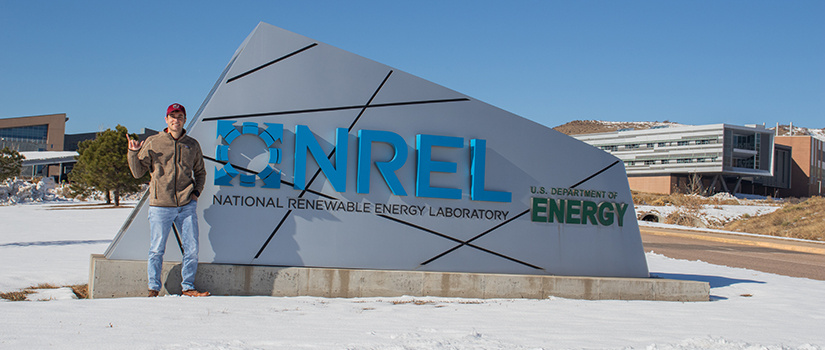How Drew Pereira became a nationally recognized researcher
Doctoral candidate Drew Pereira is contributing innovative ideas and game-changing technologies to things like electric vehicles, going green, and real clean and renewable energy with his doctoral research. But now, the impact of his work is being recognized not only within the University of South Carolina, but by national laboratories.
Pereira submitted a proposal to the Department of Energy-Office of Science Graduate Student Research Program (DOE-SCGSR) as a chemical engineering student for the fall 2019 solicitation. He was one of 62 graduate students from across the nation accepted for academic merit and research proposal merit. In October, he moved to Colorado to perform his own research among some of the nation’s leading scientists at the National Renewable Energy Laboratory.
This program gives graduate students the opportunity to collaborate with a Department of Energy laboratory scientist to further their own thesis research. “I was really happy that I could get the opportunity to try to use what I’ve learned so far and take it to the next level,” said Pereira.
He began researching as a graduate assistant at UofSC under Professor John W. Weidner, focusing on multiscale modeling of electrochemical systems, particularly, advanced lithium-ion battery systems. Weidner soon took note of Pereira’s interest in mathematical modeling of energy-storage systems within the electrochemistry field, and knew he’d do great things with his research.
“His path in graduate school has been a wonderful blend of theory and practice, working jointly with academic, industrial and government scientists,” said Weidner, now the dean of the University of Cincinnati’s College of Engineering and Applied Science. “I have sought these types of collaborations throughout my career because I believe it is the absolute best way to conduct research and educate students. I am thrilled that Drew has taken a similar path, and I am excited to see where his career goes after he graduates this summer.”
In his time in the CEC, Pereira landed an internship with General Motors and bonded with multiple faculty members that he knew he could depend on. “I’ve always had someone I can approach and talk to about my research questions… sometimes, talking to an expert is necessary to even know what questions I should be asking,” said Pereira.
Pereira now has the opportunity to collaborate with other scientists throughout his fellowship at NREL, where he is learning how things like relative nickel-content and electrode aging can affect mechanical stability of cathode materials. The national lab is focused on studying batteries for electric vehicles and energy storage on a larger scale to take advantage of renewable resources, and Pereira’s own model is a useful contribution.
“Networking is invaluable. Not only do I get the ability to see if I favor a role within the DOE, but I also will maintain these relationships moving forward in any role,” said Pereira.
Through the DOE-SCGSR fellowship program, Pereira is being mentored by UofSC alumnus and current NREL researcher Shriram Santhanagopalan. His proposed research is a combined experimental and theoretical approach to understand how lithium diffuses around and across crystalline grain boundaries in electrode active materials. Mathematically describing this diffusion behavior supports an underlying goal of simulating the mechanical degradation that occurs in electrodes in order to better predict capacity fade in batteries.
While this opportunity is a huge accomplishment for Pereira and his research, he credits where he is today to the University of South Carolina, a bit of luck, and hard work. He says his experience at South Carolina has been extremely well-rounded, with a combination of “great academics, a stimulating industry internship, and a fruitful national lab experience.” Because of this, Pereira has been able to reach goals he didn’t even know he had before coming to the university.
